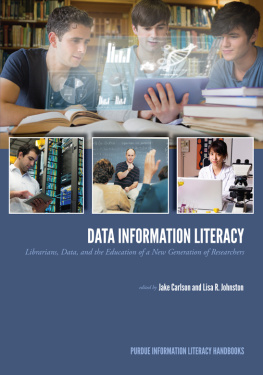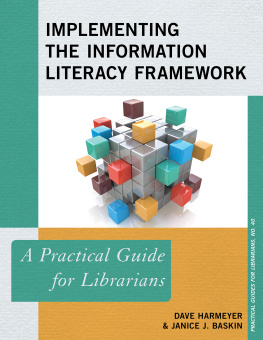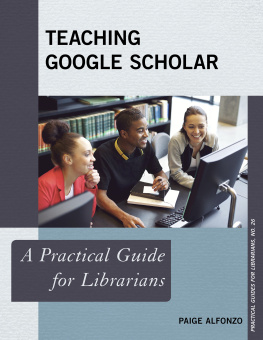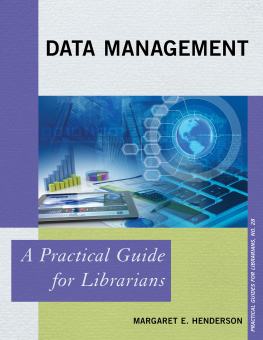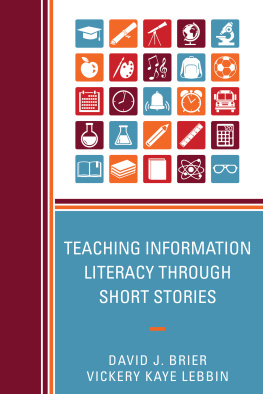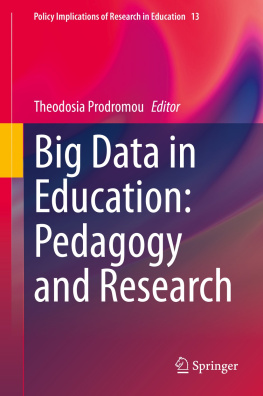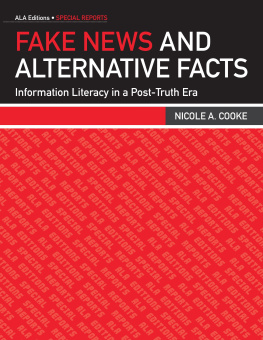Jake Carlson - Data Information Literacy: Librarians, Data and the Education of a New Generation of Researchers
Here you can read online Jake Carlson - Data Information Literacy: Librarians, Data and the Education of a New Generation of Researchers full text of the book (entire story) in english for free. Download pdf and epub, get meaning, cover and reviews about this ebook. year: 2015, publisher: Purdue University Press, genre: Home and family. Description of the work, (preface) as well as reviews are available. Best literature library LitArk.com created for fans of good reading and offers a wide selection of genres:
Romance novel
Science fiction
Adventure
Detective
Science
History
Home and family
Prose
Art
Politics
Computer
Non-fiction
Religion
Business
Children
Humor
Choose a favorite category and find really read worthwhile books. Enjoy immersion in the world of imagination, feel the emotions of the characters or learn something new for yourself, make an fascinating discovery.
- Book:Data Information Literacy: Librarians, Data and the Education of a New Generation of Researchers
- Author:
- Publisher:Purdue University Press
- Genre:
- Year:2015
- Rating:4 / 5
- Favourites:Add to favourites
- Your mark:
Data Information Literacy: Librarians, Data and the Education of a New Generation of Researchers: summary, description and annotation
We offer to read an annotation, description, summary or preface (depends on what the author of the book "Data Information Literacy: Librarians, Data and the Education of a New Generation of Researchers" wrote himself). If you haven't found the necessary information about the book — write in the comments, we will try to find it.
Given the increasing attention to managing, publishing, and preserving research datasets as scholarly assets, what competencies in working with research data will graduate students in STEM disciplines need to be successful in their fields? And what role can librarians play in helping students attain these competencies? In addressing these questions, this book articulates a new area of opportunity for librarians and other information professionals, developing educational programs that introduce graduate students to the knowledge and skills needed to work with research data. The term data information literacy has been adopted with the deliberate intent of tying two emerging roles for librarians together. By viewing information literacy and data services as complementary rather than separate activities, the contributors seek to leverage the progress made and the lessons learned in each service area.
The intent of the publication is to help librarians cultivate strategies and approaches for developing data information literacy programs of their own using the work done in the multiyear, IMLS-supported Data Information Literacy (DIL) project as real-world case studies. The initial chapters introduce the concepts and ideas behind data information literacy, such as the twelve data competencies. The middle chapters describe five case studies in data information literacy conducted at different institutions (Cornell, Purdue, Minnesota, Oregon), each focused on a different disciplinary area in science and engineering. They detail the approaches taken, how the programs were implemented, and the assessment metrics used to evaluate their impact. The later chapters include the DIL Toolkit, a distillation of the lessons learned, which is presented as a handbook for librarians interested in developing their own DIL programs. The book concludes with recommendations for future directions and growth of data information literacy. More information about the DIL project can be found on the projects website: datainfolit.org.
Jake Carlson: author's other books
Who wrote Data Information Literacy: Librarians, Data and the Education of a New Generation of Researchers? Find out the surname, the name of the author of the book and a list of all author's works by series.

